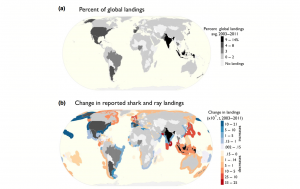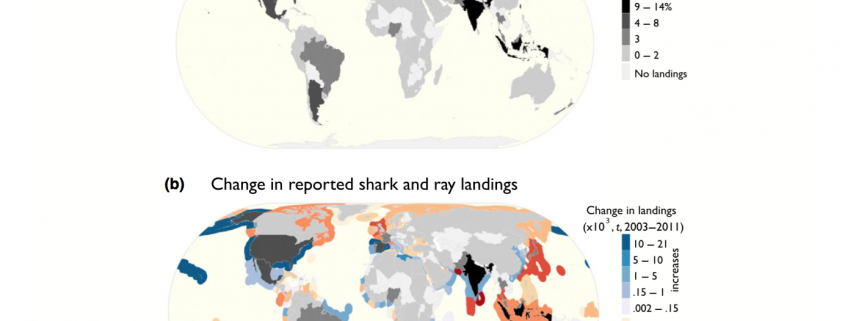Why have global shark and ray landings declined: improved management or overfishing?
By Patrick Goebel, SRC Intern
A decline in shark and ray landings could be thought of as a success for in improved management strategies. However, in the case of Davidson et al (2015), that is too good to be true. Sadly, the decline in global shark and ray landings has been attributed to overfishing and other ecosystem influencers.
Sharks and rays are commercially valuable for their fins, meat, liver, oil and skin with their fins and meat in the highest demand. The demand for shark products is relatively new, as their commercial value has only increased with the decline of other valuable fisheries. The increase in fishing pressure combined with the lack of laws regulating the shark and ray fishery has resulted in population declines.
The rapid decline in shark and ray populations resulted in new management strategies. Davidson et al (2015), investigated these new management strategies to determine if declines in shark and ray catches were a result of the fisheries management performance or over.

fishing.
Figure 1. Global distribution of (a) country-specific shark and ray landings averaged between 2003 and 2011 and mapped as a percent of the total. (b) the difference between the averages of landings reported in 2001-2003 and 2009-2011
Shark, ray, skate, and chimaera landings from 1950 (earliest years of reporting) to 2013 were investigated. In total, 126 countries shark and ray landings were modeled against indirect and direct fishing measures and fisheries management performance.
The peak of shark and ray landings was 2003 and has declined by about 20% in the past decade. As stated in Davidson et al (2015), the reduction in shark and ray landings are related to indirect and direct measures of fishing pressure rather than management implementation. This shows that sharks and rays are being harvested at an unsustainable rate. Furthermore, Davidson et al (2015), highlighted several countries that deserve prioritization for conservation and management action. The greatest declines were reported in Pakistan and Sri Lanka, both of which have little to no management. If new management strategies are not implemented into these countries, sharks and rays will continue to be harvest at damaging rate.
Davidson, Lindsay NK, Meg A. Krawchuk, and Nicholas K. Dulvy. “Why have global shark and ray landings declined: improved management or overfishing?.” Fish and Fisheries (2015).




Leave a Reply
Want to join the discussion?Feel free to contribute!